Juicing is often a debate in the health circles, whether it’s as good as many people claim it to be. So if you’re wondering ‘can I juice on a plant-based diet,’ the answer is not quite so simple. Juicing is essentially plant-based, but to get a better answer, you should look at the big picture.
Most of the juices we drink come from vegetables and fruits. But you can simply eat those vegetables and fruits too. So what’s the difference between eating fruit and drinking its juice? Quite a lot, actually!
Juicing is not exactly bad for you either because it does involve many essential nutrients at the end of the day. Some people use it as a detox, while some do it to get more nutrients. It may also help people who eat an omnivorous diet pack in more plant-based foods in their diet.
What is Juicing?
Juicing basically refers to extracting juice out of fruits and vegetables. It gets rid of all the solid elements of the food like the skin, pulp, and seeds. The term juicing is often used to describe a temporary diet where you consume only juices. It can go for a few days to a few weeks.
Juice machines produce the juice out of these fruits and vegetables. There are two types of juicers essentially: centrifugal and cold-press.
Centrifugal juicers blend all the ingredients and turn them into a fluid. Cold-press juicers use force to press out the juice from the ingredients. It works slower than the former type and purely produces juice free from any kind of pulp.
Juicing is primarily used to detox the body or boost nutrient intake. While juicing is pretty popular for detoxification, it’s not scientifically proven that it does that. You do get a lot of nutrients, though, except some.
Does Juicing Really Cleanse Your Body?
Juicing is seen as a natural detoxification method. This is debatable mainly because there are not any reliable studies or experiments that have proven this. Also, detoxification is sort of relative as different people may see it differently. Some people may want to detox their blood, some may want to improve digestion, and so on.
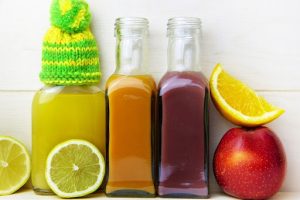
The fact of the matter is that there is no hard proof that juicing detoxifies your body. Yes, it does boost certain nutrients, and you get a lot of vegetables and fruits. However, you can also get those effects by simply following a whole-food plant-based diet.
A Scientific Reports study, involving 20 participants, found that juicing did lower weight and also improved gut bacteria. They found that the participants had an increase in good bacteria. That’s not surprising as juices contain fruits and veggies, which tend to have that effect on your digestive tract.
Even if we go by this study and consider it as a detox for your colon, it’s hard to ignore the ultimate colon cleanser, i.e. fiber. Fiber is the main nutrient that can drastically improve digestion and promote a healthy microbiome. And juices actually lose most of their fiber.
Is Juicing Good for Weight Loss?
Juicing can help with quick weight loss, but if it’s a good route to take is another question. The idea behind juicing to lose weight is that you lower your caloric intake while getting some essential nutrients to get through the day.
Most people following a juicing diet for days or weeks only drink juices throughout the day. In terms of calories, they don’t consume more than 1000 calories a day. It doesn’t take any complex mathematics to see that such a lower intake of calories will reduce weight. Your body will start relying on all that stored weight.
So you can say that juicing can help you lose weight. However, it’s not sustainable because maintaining such a high caloric deficit can be hazardous. Also, vegetables and fruits are great, but you also need to consume other types of foods for well-balanced nutrient intake. For instance, you may not be getting ample carbs, which your body prefers for energy production.
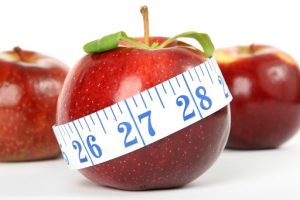
A study from the American Journal of Clinical Nutrition tested severe caloric restriction for treating obesity. While this study was not directly studying juicing, it did confirm that severe caloric restriction can actually slow metabolism.
What this basically means is that you’ll likely gain some weight back again once you’re off juicing. Since your metabolism has slowed down, even a normal number of calories may be too high for your body.
Juicing can perhaps be a good option when you need to lose a pound or two quickly. However, if you’re highly overweight or obese, you cannot just rely on juicing for weight loss. It won’t be sustainable, and even if you do lose a lot of weight, you will end up having other problems.
What are the Benefits of Juicing?
If we talk about juices, in general, there are many benefits to drinking them. Even if you’re just juicing for a certain time, you do get the goodness of vegetables and fruits.
Higher Intake of Fruits and Vegetables
An average American today is not getting nearly enough vegetables and fruits. While there has been a lot of buzz about organic and local produce, the truth is we’re still far from getting what we actually need.
Does Juicing Help With Disease Prevention?
Fruits and vegetables are the ultimate superfoods packed with nutrition and health benefits. These foods can protect you from myriads of disease, including heart disease, hypertension, stroke, and cancer.
Juicing for disease treatment is the main element of the Gerson Therapy. The Gerson Therapy is an alternate treatment for cancer and other chronic diseases, developed by Dr. Gerson in the 1900s. It claims that it can reverse chronic conditions by detoxifying the body and boosting immunity.
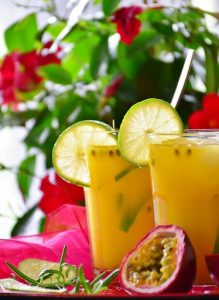
While there’s no scientific evidence to support these claims, some of their patients have reported improvements and reversals. The Gerson diet relies mostly on plant-based foods in the form of raw juices. So you can say it’s the toughest type of juicing.
They also use supplements, and the therapy may last for at least two years. Also, it can be incredibly expensive, and you have to register with them first to get into the program.
Can Juicing Give You a Nutrient Boost?
Juicing can help supplement your body with nutrients from veggies and fruits that perhaps you’re not getting enough of. This is especially true for people who don’t follow a plant-based diet and primarily eat animal-based foods. Juicing can be a good way for such people to add more veggies and fruits without much hassle.
You do get a lot of vitamins and minerals through juices. Also, you get to combine many different types of foods in one drink, which makes it all the more potent. It’s worth mentioning that some people may find juices to be more delicious than actual fruits.
Is Juicing Good for People Who Cannot Eat Solids?
Juicing can also benefit people who may not be able to eat solids regularly, like those with gastroparesis. People with certain gastrointestinal conditions may also benefit from drinking more juices than eating solid foods. This way, they are able to get many nutrients from vegetables and fruits without needing to digest them in solid form.
What are the Side Effects of Juicing?
So can I juice on a plant-based diet? Yes, but juicing as a regular thing can have several side effects:
Loss of Fiber
The biggest con of juicing is that you don’t get enough fiber. Fiber, as you know, is an essential nutrient that helps with so many things. Mainly, it improves digestion and helps you get regular. Fiber also helps to reduce high cholesterol, regulate blood sugar, and lose weight.
Depending on how you’re extracting the juice, the end product may be completely devoid of the fiber. Vegetables and fruits are one of the main sources of fiber. So when you eliminate fiber out of them, it begs the question: are they even healthy anymore?
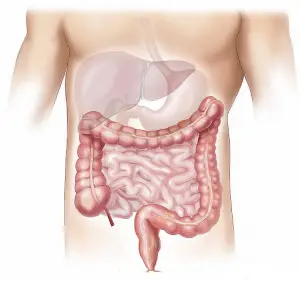
This may not be such a big problem if you consume enough fiber normally. However, if you’re frequently juicing for long periods, your body will be seriously devoid of fiber. That’s not a good thing for several reasons.
As Dr. Michael Greger explains in his video ‘Juicing Removes More than Just Fiber,’ fiber has a much bigger role to play. Certain phytonutrients like polyphenols are attached to fiber, so when you lose fiber, you lose these important components.
High Sugar
Fruits contain a lot of sugars that may be offset by the fiber content they offer. When you eliminate the fibers, the concentration of sugars increases. Juices usually contain a high amount of sugar, even those without added sugar.
This high sugar content of juices makes it questionable to drink it so often, especially in lieu of whole foods and grains. A BMJ observational study compared the effects of fruit juice and whole fruits on type II diabetes risk. The study found that fruit juice increased the risk of diabetes, whereas whole fruits reduced it.
Juices Cannot Replace Meals
Let’s be honest, juices cannot replace your regular meals, at least not in the long run. Juicing for less than a week may not be so grave, but relying on just juices for weeks can be dangerous.
A plant-based diet is not just about fruits and vegetables; it also contains other food groups, such as whole grains, nuts, and legumes. You may become deficient in protein and certain important B vitamins. In order to lose weight and stay healthy, you need wholesome plant-based meals with all the essential nutrients.
Smoothies vs. Juices: Which One is Better?
Smoothies may be the best kind of juicing there is. As evident by so many studies, juices don’t quite deliver the benefits whole fruits do. Fruit juice can increase the risk of diabetes and also raise your cholesterol. That’s, of course, due to the loss of fiber.
Fiber is not just there to make your bowel movements more regular and solid. Turns out, it’s essential for the absorption of minerals. In this article, over at NutritionFacts.org, Dr. Greger notes that fiber helps in the absorption of calcium. He recommends drinking smoothies instead of bare juices.
Smoothies basically use the whole fruit as you blend it. So you do get the fiber content of the fruits as the blender purees the fruits and vegetables but still maintains the molecular bonds of fiber.
Healthy Plant-based Juicing
Juices are an important part of your diet, provided you’re making and consuming them the right way. Go for whole-food juices (smoothies) that don’t leave out any pulp. Juices can have fiber depending on the type of juicer you’re using. Stick to those that blend or leave at least some pulp in the juice, instead of completely eliminating it.
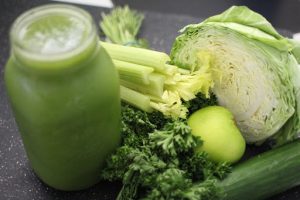
Here are some extremely healthy plant-based juices you can juice with or just drink normally as part of your daily diet:
- Green Juice: Made with your average leafy greens, the green juice is a power booster, a perfect concoction to start the day with. Leafy greens are rich in disease-fighting antioxidants and important minerals like calcium and iron.
- Carrot, Apple, and Cucumber Juice: Most vegetables and fruits juices are not quite tasty as it’s difficult to find the right mix of flavors. Carrot and apple juice is a clear winner in terms of taste. But you can also add cucumber, which doesn’t really add a strong flavor.
- Pomegranate Juice: Pomegranates are rich in vitamin K, which is highly beneficial for heart health. You can drink it’s fresh juice when in season, and bottled ones throughout the year. Some people don’t like the seeds in them, so juicing it may be a good option.
- Beet, Strawberry, and Blueberry: Often termed the antioxidant blasts, this juice mix uses three of ingredients incredibly high in antioxidants. The earthy beets balance the sweetness of the berries.
- Kale, Orange, Banana, and Strawberry: A mix of leafy green, fruits, and a berry, this smoothie is a powerhouse of strength and nutritional goodness. It will also be high in fiber because of the ingredients.
Wrap Up
So the next time someone asks you, can I juice on a plant-based diet, you know the answer. Juicing is great if you don’t overdo it and focus on smoothies more than juices. You can easily circumvent the few side-effects by keeping fiber intact and also prioritizing whole foods first.
It can be a viable way to shed some pounds quickly but don’t make it a lifestyle. Remember, a plant-based diet is all about whole foods.










